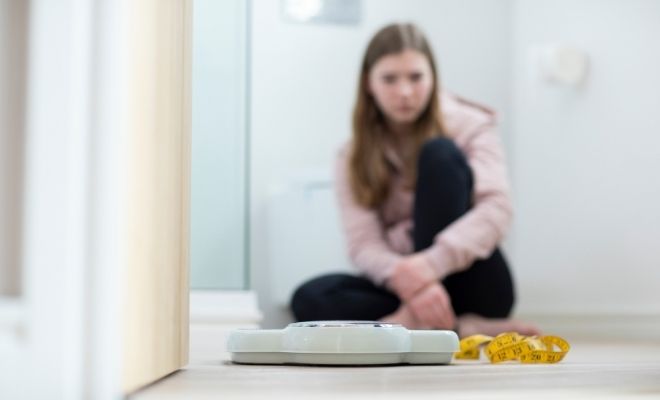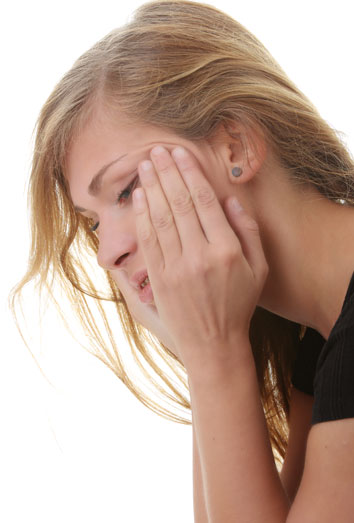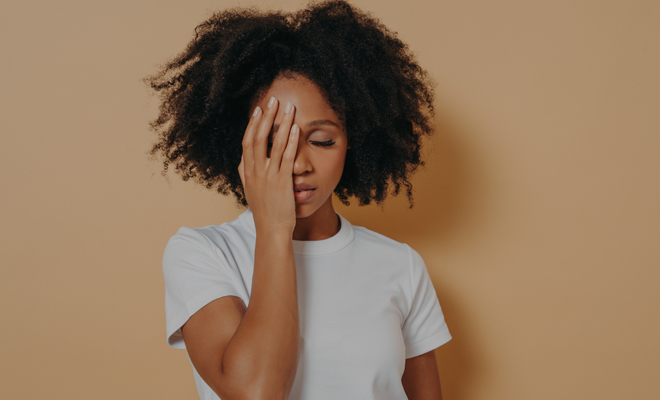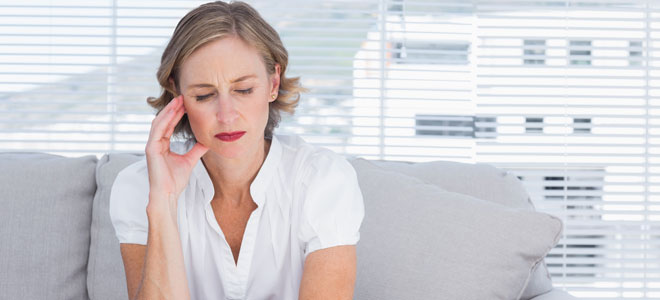The relationship between anxiety and eating disorders is more than proven, as is the tendency to overeat during periods of increased stress or anxiety. However, excess food is not the only reason why we gain weight with anxiety.

Although there are many people who experience considerable weight loss when they suffer from an anxiety disorder, gaining weight is also one of the. Something that we must avoid, because if we discover ourselves with a few extra kilos, we can make our anxiety problem even worse. But… how to avoid gaining weight from anxiety?
Why do we gain weight with anxiety?
The main reason why we gain weight from anxiety is because we eat more. Stress, anxiety and nerves make us change our relationship with food as well as completely transform our daily habits. A binge on food with fats and sugars seems to be the quickest option to calm the nerves. However, it is a very brief feeling of well-being, because as soon as we realize what we have just eaten, the anxiety returns.
Eating in excess is, without a doubt, a behavior that we must avoid, especially in moments of anxiety, although it is not easy. It’s not the only reason we get fat either. There seems to be a close relationship between the state of alarm produced by anxiety and the accumulation of body fat, although it has not been proven.
In addition, one of the main reasons that lead us to be hungry throughout the day and not be able to calm it down despite everything we eat is lack of sleep. Poor sleep is both a symptom and a consequence of anxiety and is not given the importance it is. When we sleep poorly, we feel fatigued, tired and with a general malaise that we try to calm down with more food.
Does anxiety make you fat?
At this point we wonder if anxiety makes us fat and the answer is no. There are also many people suffering from anxiety who see how they lose weight because the panic attacks mean that they can hardly eat anything. But it is true that the famous anxiety binge is also common.
Apart from the fact that our metabolism can also change and be affected by an anxiety problem or even by drug treatment, weight change is not so evident as to worry. The real concern is the anxiety itself, not the weight gain, something we can easily reverse later should it occur.
The error is in the reason why we gain weight when we have anxiety, which is none other than eating more or eating foods high in fat and sugar. The sensation of eating something sweet, for example, is of immediate well-being and that is precisely what we need when we are feeling permanent discomfort due to anxiety. But that well-being that food provides, as soon as it comes it goes away and we find that the discomfort increases.
And now the discomfort is no longer just because of anxiety itself, but because of having wiped out everything we had in the pantry. This is also expressed in degree thesis on stress and nutrition: “If one is worried about future events or repeatedly thinks about past conflicts, eating foods that comfort can distract them. But when you when you finish eating, your attention returns to your worries, and you can now carry the additional weight of guilt for having eaten too much.”
So the question would be, is there any other way to reduce anxiety discomfort without eating? There certainly is. For many, going out for a coffee with a friend, going for a walk, shopping, watching a series or reading a book has the same effect. And what about people who play an instrument?
Starting a diet when you have anxiety
But all these options are nothing more than avoidance strategies to avoid facing the real problem that is anxiety. Anxiety bothers, overwhelms, anguish and we desperately seek some stimulus that will take us away from all those negative emotions. If we have found the stimulus in food, it is most likely that we will gain weight.
Gaining weight due to anxiety is not what should worry us the most and it is NOT the best time to diet. It is one thing to pay more attention to what we eat and opt for a healthy diet and another thing is to start a diet in the middle of the anxiety process. Because? Because all our effort should be focused on overcoming this anxiety disorder. So forget about the diet, at least for now.
In fact, overcoming an anxiety disorder involves understanding that avoidance mechanisms do not work, that we cannot look the other way and that it is not even healthy to try to avoid the discomfort that anxiety causes us. It seems contradictory, but the only way to reduce this discomfort is to accept it , stop fighting against it, stop resisting it, accept that it is there as something natural and focus attention on other aspects.
What other aspects? The acceptance of emotions is key to overcoming anxiety, but it is also key to looking at ourselves in a more understanding and compassionate way, ourselves for having anxiety or for suffering and discovers all those things that make us feel good. Without using them as an avoidance strategy, but also accepting that we deserve to take care of ourselves, pamper ourselves and treat ourselves. And if that whim goes through an afternoon of series with sweets or a meal with friends that end with a fabulous dessert, it is also healthy. Do not cut yourself.
Tips to avoid weight gain due to anxiety
In the case of weight gain due to anxiety, it is easier to recognize where the problem is, even inappropriate behavior, than to put a solution to it. The truth is that it is not easy to control the anxiety to eat, but we can try with some tricks.
Maybe it’s time to switch to a healthy diet. As we have already said, it is not about dieting precisely when you are suffering from an anxiety disorder, but about eating a healthy, varied and balanced diet in which foods that promote also prevail.
Do not have foods high in fat and sugar at home. So, if you can’t help but binge, at least it will be healthier food.
Learn breathing to control your nerves in a way that doesn’t include food. You will be surprised with the benefits of breathing to prevent you from jumping into the fridge to eat whatever you have.
Along with the breathing exercises, you can start practicing, meditating, and getting used to focusing your attention on the present moment so as not to let the discomfort of anxiety lead you to seek an avoidance mechanism such as eating without control.
Speaking of exercises, yes, both to overcome an anxiety disorder and to avoid gaining weight, it is necessary to do some physical exercise. You don’t have to grind yourself in a gym or sign up for a triathlon, just go for a brisk walk every or almost every day in the nearest park.
Drink plenty of water to feel full and don’t rush to eat something. Water in small sips is always healthy, it doesn’t make you fat, and this simple gesture can help you resist the temptation of food.
Eat small amounts but frequently throughout the day, so you won’t feel hungry. They also say that this way of organizing the food you eat throughout the day is the healthiest.
Avoid coffee and stimulating drinks that increase nerves and the desire to eat. When you feel nervous and have anxiety problems, the fear of having a crisis often leads you to seek avoidance strategies that are not always healthy. If you already have anxiety, don’t increase it with stimulants.
Sleep. Sleep as much as you can and maintain that allows you to wake up rested and with energy. This point is essential because not having a good quality of sleep makes you wake up tired. And when you’re tired, you don’t have the strength to resist getting that immediate gratification of binge eating.






